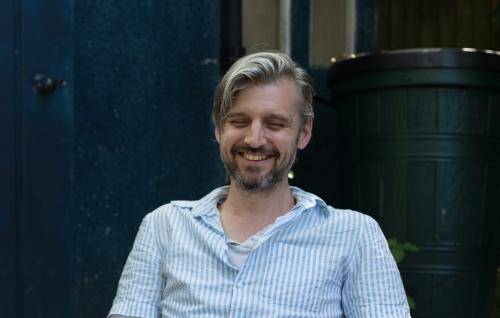I Was There: 4 - The Centurian
I Was There: 4 - The Centurian
Biblical Scholar Dr Paula Gooder reflects on different characters who witnessed the events of Holy Week and Good Friday.
The Centurion
I was there…I’ll never forget it.
You get used to crucifixions after a while. I know people think we Romans enjoy them. I don’t. I have a heart after all – it’s probably quite shrivelled after everything I’ve seen and done -- but I do have one. You would have to lose all sense of humanity to enjoy the sight of someone hanging with their life slowing seeping out of them, each breath a little harder than the last until eventually their strength gives out and they suffocate from the weight of their own body. Sometimes if people were young and strong they would last for days, until we could bear it no longer and we’d break their legs to hurry them on their way. Their rasping breaths worked their way into my dreams at night. There’s barely a night goes by that I don’t wake up in a cold sweat the dying breaths of hundreds of people echoing in my ears. So no – I don’t enjoy them but they do a job at keeping the rebels in check. You just can’t think about it too much. I’ve become quite an expert over the years in the art of crucifixion. I could tell from the start who would last a long time and who would go quickly; who would rail and curse until their last breath and who would sob and beg for mercy.
That day was different. He was different. I’m not saying anyone deserves to go like that but some are more deserving than others. In all my time in the army, though, from all the many hundreds of people I had nailed up on crosses, I had never seen anyone like him. There was something about him. It wasn’t just that he was neither a curser or a sobber. It was that most of the time until the end he was silent – not sullen and sulking we have plenty of those too -- he was completely quiet. It was as though he’d made his peace with the pain; as though he had turned and embraced the whole thing; as though he was doing it kind of willingly; as though he thought it was for something.
By the time we got him on the cross he was in a pretty bad shape. We don’t normally flog people before we crucify them. If we flog them they die quicker and whole point is that their death is long, slow and agonising – if they’re half dead by time you nail them up there’s less of a spectacle. But Pilate told us to flog him – so flog him we did within an inch of his life. I rather got the impression that Pilate had hoped that this would do -- that we would flog him and let him go.
I guess whatever it was about him that got to me got to Pilate too. And Pilate’s no tender flower. He’s got quite some reputation – vicious and brutal are the first two words that normally spring to mind. But even Pilate seemed a bit reluctant to send him to his death. That day, though, the crowd scared him. You could feel it. They were like dry wood. The tiniest spark would have set them ablaze. And this man that looked so gentle, peaceable, and loving seemed to be that spark. Ah well – it is better that one good man dies than that we all go up in flames.
So we got him on the cross – if I’m honest I thought he was going to die on the way. I had to grab some bloke coming in from the fields to carry the cross beam the last bit or we might have had no crucifixion at all. Once he was there we nailed his crime to the cross above his head. We liked to do that so that people knew what would happen if they did what the criminal had done. We normally wrote – robber or rebel. Something like that. This one, I have to say was an odd crime. King of the Jews? What kind of crime is that? But Pilate insisted and when I saw the High Priest’s face I knew what Pilate was up to. He wasn’t happy and was making sure they knew it. He might have been afraid of the crowd but he still loved annoying them.
Once we get them up there – on the crosses – there’s often quite a long time until anything happens. You just have to make sure none of their mad relatives try to get them down again so there’s plenty of time to share out their stuff, play dice and gossip. But this time was different, I just couldn’t settle. It didn’t help that the sun disappeared and it was dark – like it was the middle of the night -- and cold, so cold, as though all the goodness and light was leaving the world as his life drained away. I lost my share of the stuff because I kept on being drawn back to him. I don’t know why - there was something, something I needed to understand but I didn’t know what.
After three hours on the cross, with his life hanging on a thread, he spoke at last. It sounded like the word they use for God – Eli something…-- but one of them standing next to me thought he was calling for Elijah. Maybe he was. I don’t know - but his voice didn’t sound like that. It didn’t sound as though he was calling for help – it sounded grey and full of despair, like there was no hope left in the world…anywhere. In that moment I felt colder than I had ever felt in my whole life. Cold all the way through to the very depths of my shrivelled heart.
Then he cried out – a piercing noise that reverberated through my body long after it had died away. After the cry, he was still. Quite still. He’d died and a sense of desolation gripped me. What had we done? I said the first thing – the only thing -- that came to mind. ‘This man really was God’s son’.
As I look back all these years later, I still believe I was right. That day we killed God’s son – what were we thinking?
I was there… I’ll never forget it.







